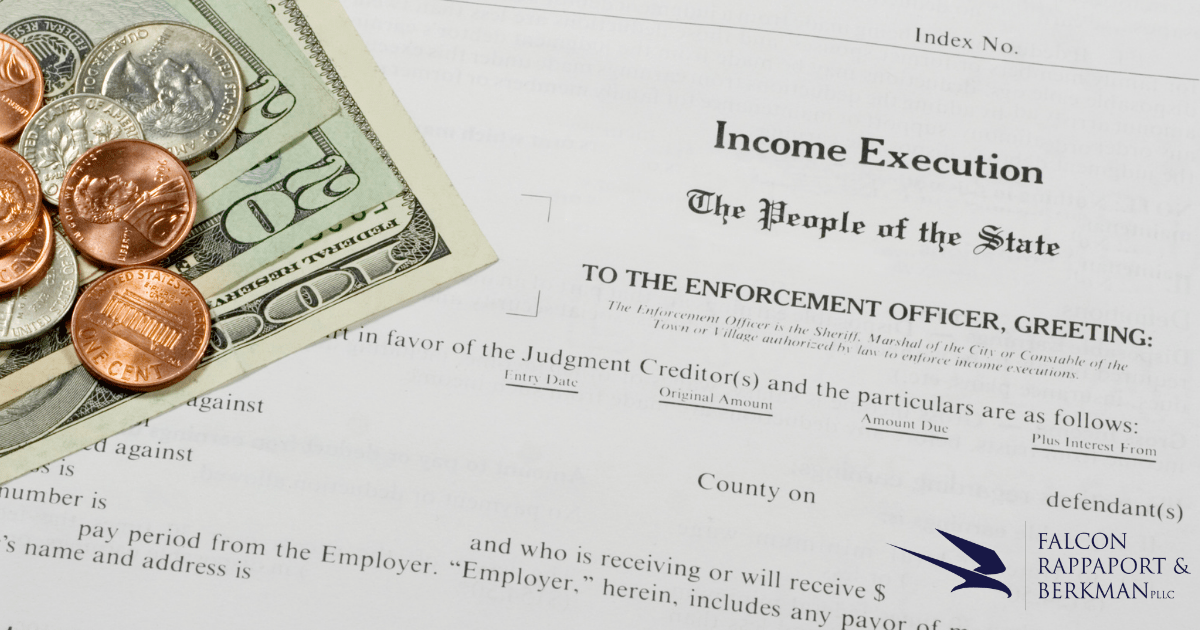Income Executions to Satisfy a Money Judgment
Income Executions to Satisfy a Money Judgment
There are many tools to help collect money from a judgment debtor. An income execution is one of them. An income execution is an enforcement instrument that requires a judgment debtor or his employer to pay a portion of his gross wages to satisfy a money judgment.
Service of an Income Execution
The sheriff’s office is responsible for serving an income execution. Within twenty days after an income execution is delivered to the sheriff, the sheriff shall serve a copy of the income execution upon the judgment debtor, in the same manner as a summons (see N.Y. CPLR § 308) or by certified mail return receipt requested. If served by certified mail return receipt requested, an additional copy of the income execution has to be sent to the judgment debtor by regular mail. See N.Y. CPLR § 5231(d).
If the judgment debtor fails to pay for a period of twenty days, or if the sheriff is unable to serve an income execution upon the judgment debtor within twenty days, the sheriff shall serve a copy of the income execution upon the person or entity from whom the judgment debtor is receiving or will receive money. See N.Y. CPLR § 5231(e).
If the judgment debtor and the judgment debtor’s employer are located in different counties, the sheriff in the county where the judgment debtor resides will first serve the income execution. If the judgment debtor fails to pay, or if the sheriff is unable to serve the judgment debtor, then the sheriff will return the income execution to the judgment creditor’s attorney, and the judgment creditor’s attorney will then need to deliver the income execution to the sheriff in the county where the judgment debtor is employed.
How Much Can Be Collected From an Income Execution
An income execution requires the judgment debtor or his employee to pay installments of not more than ten percent of the money the judgment debtor received or will receive, subject to the limitations set forth below.
Limitations of the Amount That Can Be Withheld
An income execution for installments from a judgment debtor's gross income cannot exceed ten percent of the judgment debtor's gross income. See N.Y. CPLR § 5231(g).
If a judgment debtor's weekly disposable earnings[1] are less than thirty times the current federal minimum wage, which is $7.25 per hour, or $217.50, no deduction can be made from the judgment debtor's earnings under this income execution. Id.
A judgment debtor's weekly disposable earnings cannot be reduced below the amount arrived at by multiplying thirty times the current federal minimum wage, which is $7.25 per hour, or $217.50, under this income execution. Id.
If deductions are being made from a judgment debtor's earnings[2] under any orders for alimony, support, or maintenance for family members or former spouses, and those deductions equal or exceed twenty-five percent of the judgment debtor's disposable earnings, no deduction can be made from the judgment debtor's earnings under this income execution. Id.
If deductions are being made from a judgment debtor's earnings under any orders for alimony, support, or maintenance for family members or former spouses, and those deductions are less than twenty-five percent of the judgment debtor's disposable earnings, deductions may be made from the judgment debtor’s earnings under an income execution. However, the amount arrived at by adding the deductions from earnings made under the income execution to the deductions made from earnings under any orders for alimony, support, or maintenance for family members or former spouses cannot exceed twenty-five percent of the judgment debtor's disposable earnings. Id.
[1] Disposable Earnings, as used herein means, “that part of the earnings of any individual remaining after the deduction from those earnings of any amounts required by law to be withheld.” See CPLR § 5231 (c)(ii).
[2] Earnings, as used herein means, “compensation paid or payable for personal services, whether denominated as wages, salary, commission, bonus, or otherwise, and includes periodic payments pursuant to a pension or retirement program” See CPLR § 5231 (c)(i).
DISCLAIMER: This summary is not legal advice and does not create any attorney-client relationship. This summary does not provide a definitive legal opinion for any factual situation. Before the firm can provide legal advice or opinion to any person or entity, the specific facts at issue must be reviewed by the firm. Before an attorney-client relationship is formed, the firm must have a signed engagement letter with a client setting forth the Firm’s scope and terms of representation. The information contained herein is based upon the law at the time of publication.

